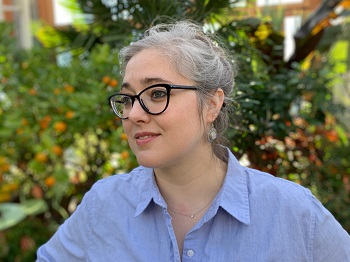
A Letter to Jane Zwart
Contributor’s Marginalia: Carolyn Oliver responding to Jane Zwart’s “On Beauty and Being Just”
7 October 2020
Dear Jane,
As I begin this letter, the festival of bachelor’s buttons and phlox outside my front door is subsiding. The cosmos are still budding, the turtleheads are surfacing, and the ruby buckwheat is turning a nearly irresistible hot pink.
I have a pessimist’s natural misgivings about the “flamboyants” you name in “On Beauty and Being Just,” those objects and creatures that multiply light and pulse with color. I suppose it’s a reluctance to enjoy what I know will wither, wilt, go extinct. But since the gray months of winter and slushy near-winter linger and linger here in central Massachusetts, my craving for color and exuberance tends to override that reluctance, and I seek out blazing maples, California poppies, goldfinches. I’ve never seen the “layered, paint-by-number capes” of the painted bunting in the wild; the robin with his “rusty apron” is the only reliable source of avian color in my garden, though I prize the occasional glimpse of a cardinal pair, or even the mean blue jay that just yesterday harangued a chickadee off a sunflower husk.
This is why your poem, which at first appears uncomfortable with ostentatious beauty, seemed so alien to me, mistrustful lover of toomuchness that I am. But that feeling soon receded as I considered the extravagant inventiveness of its metaphors: “Maybe / the hibiscus is not a satellite dish / tilting on its stem” but “an umbrella mortified / that day has left it open”; “the cupped palm of a modest / earth, smoothing her skirt.” Here, in striking images, is a speaker too devoted to beauty to shame it for long.
And as the speaker reconsiders and reframes her position—“It is possible,” “maybe,” “But there, too I have been unjust”—I found myself examining my own partialities. Have I been unfair to the plain things of this world—sparrows, lawn mushrooms, wood asters—by allotting my attention to the obviously splendid? Why does the appearance of a cardinal punctuate one of these strange, isolated days the way the appearance of a sparrow flock does not?
I’m not sure that’s an answerable question. So: “Wanting to be fair // let me trade it for plain delight.” Maybe it’s enough that beauty, in all its incarnations of shimmer and flash and song (I think of “rose mallow to flower / rue”—the lovely music in this phrase of yours!), slips past our defenses and calls for our attention. Commands, cajoles, beckons.
Thank you, Jane, for this poem, this beckoning.
Take care,
Carolyn
